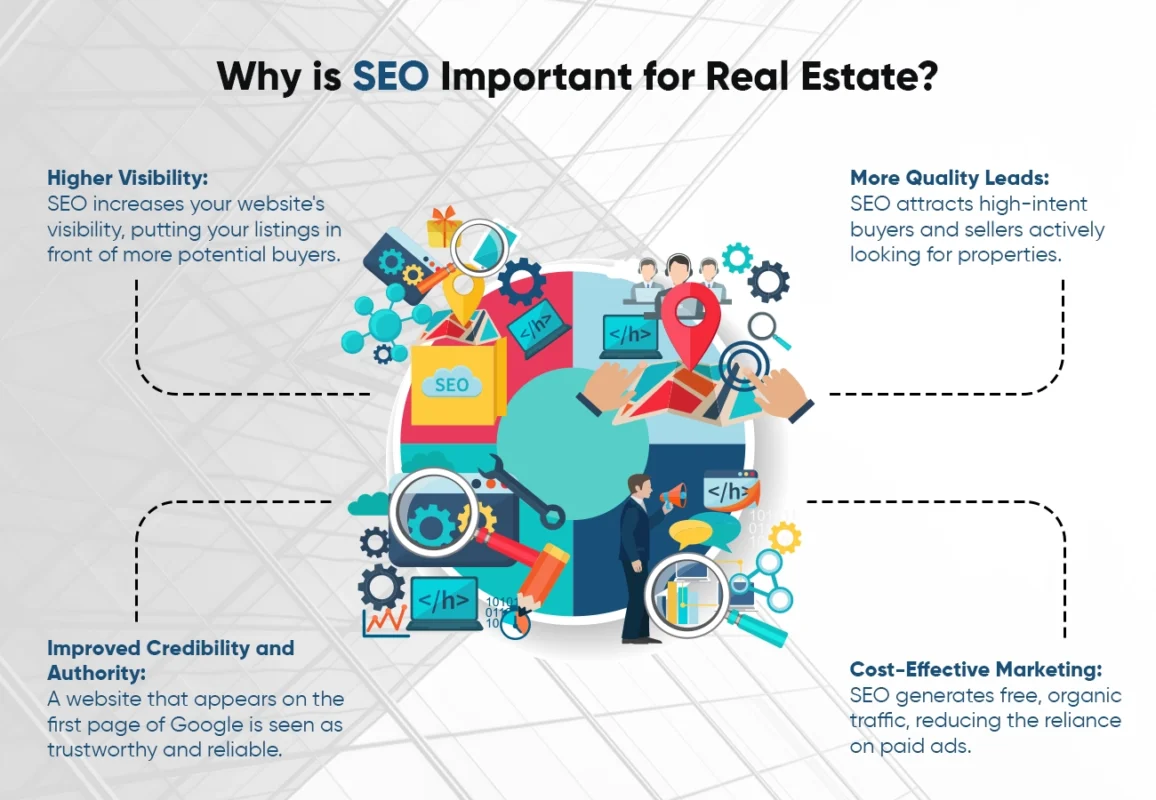Having a strong internet presence has become crucial in the current real estate market. Considering that most buyers and sellers start their property searches online, it is essential to make sure your real estate website ranks well in search results. Your capacity to successfully facilitate real estate transactions may be significantly impacted by this. Real estate SEO, or search engine optimization, is essential in this situation for increasing online exposure and establishing a connection with potential customers.
If you’re a real estate agent, broker, or agency owner, mastering SEO can set you apart from competitors and position your business as a go-to resource for property listings. In this guide, we’ll explore actionable SEO strategies to help you rank higher on Google and attract more qualified leads.
What is Real Estate SEO?
The act of improving your website, content, and online presence to rank better for pertinent real estate-related keywords in search engine results pages (SERPs) is known as real estate SEO. It focuses on increasing visibility to potential buyers, sellers, and renters searching for properties online.
Since most property searches are location-specific, real estate SEO uses hyper-localized strategies in contrast to general SEO. Real estate agents may generate leads, close transactions more quickly, and increase organic traffic to their websites by being proficient in SEO.
Why is SEO Important for Real Estate?

- Higher Visibility: SEO increases your website’s visibility, putting your listings in front of more potential buyers.
- More Quality Leads: SEO attracts high-intent buyers and sellers actively looking for properties.
- Improved Credibility and Authority: A website that appears on the first page of Google is seen as trustworthy and reliable.
- Cost-Effective Marketing: SEO generates free, organic traffic, reducing the reliance on paid ads.
Crucial Elements of Real Estate SEO
You must concentrate on the essential elements of real estate SEO if you want to rank higher and sell more quickly. Let’s examine each of these crucial areas:
1. Researching Keywords for SEO in Real Estate
The cornerstone of every effective SEO plan is keyword research. It entails figuring out what search phrases your target market uses to find real estate online.
How to Find the Right Keywords
- Use Local Keywords: Include specific location-based keywords like “2-bedroom apartments in Los Angeles” or “affordable homes in Miami.”
- Leverage Long-Tail Keywords: These are specific, less competitive keywords that capture intent, such as “pet-friendly condos for rent in Chicago.”
- Make Use of SEO Tools: You may identify the top-performing keywords by using tools such as SEMrush, Ubersuggest, and Google Keyword Planner.
Pro Tip
Don’t just target keywords like “real estate for sale.” Instead, focus on buyer intent, like “buy a house in [city name]” or “luxury apartments for rent in [city name].”
2. SEO Optimization on-page
On-page SEO involves optimizing elements directly on your website to improve search engine rankings. Here’s how to do it effectively:
Title Tags and Meta Descriptions
- Write compelling, keyword-rich title tags (under 60 characters) for each page.
- Create meta descriptions (under 160 characters) that entice users to click on your link in search results.
Header Tags (H1, H2, H3)
- Use clear and structured headings with primary and secondary keywords.
- Break up content with H2s and H3s for better readability.
Content Optimization
- Write valuable, informative blog posts like “Top 10 Neighborhoods to Buy a Home in 2024.”
- For better optimization, it’s really necessary to avoid keyword stuffing.
Image Optimization
- Compress images to improve page speed.
- Add descriptive ALT text with location-based keywords for images.
Internal and External Linking
- Use internal links to guide visitors to other pages on your site (e.g., “Check out our latest property listings”).
- Link to authoritative external sites when relevant.
3. Local SEO for Real Estate
Since real estate is location-dependent, local SEO plays a vital role in helping your business rank for city-specific searches.
Google Business Profile
- Create a Google Business Profile and keep it updated with your NAP (Name, Address, Phone) information.
- Ask for and respond to customer reviews, as positive reviews boost local rankings.
Local Citations
- List your business on real estate directories like Zillow, Realtor.com, and local business directories.
- Ensure your NAP is consistent across all online platforms.
Local Content Creation
- Write neighborhood guides, market reports, and community spotlights.
- Highlight local landmarks, schools, and events in your content.
4. Technical SEO for Real Estate Websites
A well-functioning website is essential for ranking higher and providing a smooth user experience.
Mobile-Friendliness
- Use a mobile-responsive design so your site works well on all devices.
- Use Google’s Mobile-Friendly Test tool to test your website.
Site Speed
- Compress images, use caching, and minimize code to reduce page load times.
- Google favors speedier websites in its results, and a sluggish website will drive away visitors.
Secure (HTTPS) Website
- Use an SSL certificate to make sure your website is safe. HTTPS websites are given preference by Google over HTTP websites.
Fix Broken Links and Errors
- Use tools like Screaming Frog or Google Search Console to identify and fix broken links and 404 errors.
5. Content Marketing for Real Estate
In addition to drawing in visitors, content marketing positions you as an authority in your industry. This is how you go about it:
Blog Posts
- Write blog posts with useful content like “How to Get Pre-Approved for a Mortgage” or “Top Tips for First-Time Homebuyers.”
Video Marketing
- Create video tours of properties and post them on YouTube (YouTube SEO also plays a role).
- Embed videos on your website and social media.
Local Market Reports
- Write local market analysis reports and update them monthly to keep your audience informed.
How to Measure Your SEO Success
Once you’ve implemented SEO strategies, tracking and analyzing your results is essential. Here are some key performance indicators (KPIs) to monitor:
- Organic Traffic: Track website visits from search engines using Google Analytics.
- Click-Through Rate (CTR): Measure how many people click on your website from Google search results.
- Bounce Rate: If visitors leave your site quickly, it could indicate poor user experience.
- Conversion Rate: Check how many leads or inquiries come from your SEO efforts.
Make data-driven decisions and track your progress using tools like Ahrefs, Google Analytics, and Google Search Console.
Common SEO Mistakes in Real Estate
- Ignoring Local SEO: Since real estate is location-based, ignoring local SEO is a costly mistake.
- Duplicate Content: Avoid copying content from other websites, as this can lead to Google penalties.
- Slow Website: A slow site deters users and hurts your rankings.
- Lack of Mobile Optimization: More than 60% of real estate searches happen on mobile devices.
The Future of Real Estate SEO
SEO for real estate is always evolving. The demand for excellent, user-focused SEO techniques will only increase as search engines like Google place a higher priority on user experience and pertinent content. Future SEO strategies will also be influenced by voice search, AI-powered search engines, and local intent searches.
Conclusion
For brokers, agents, and real estate companies, real estate SEO is revolutionary. You may increase the number of potential buyers and sellers who visit your website by concentrating on local SEO, optimizing for speed and mobility, and providing worthwhile content. To understand your audience’s search preferences, develop content tailored to their area, and keep your website quick and easy to use, do keyword research.
SEO requires patience, consistency, and a data-driven approach, but the payoff is worth it. If you implement these strategies, you’ll position your real estate business to rank higher on Google, increase brand visibility, and sell properties faster.














